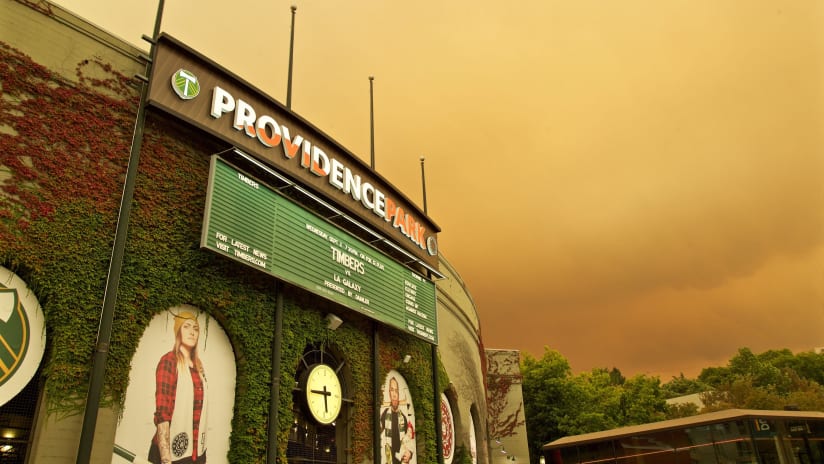This MLS season has already been hit by a global viral pandemic and resulting shutdowns and economic slowdowns, more galling incidents of police violence against Black Americans and subsequent protests and societal discussions about structural racism, as well as the general political upheaval around a contentious US election set for November.
As if all that wasn’t enough to deal with, several MLS clubs on the West Coast have been affected by the dozens of horrendous wildfires burning across more than four million acres, blanketing much of the region in smoke that has reached hazardous levels in many areas.
“As we know, this is 2020,” Portland Timbers head coach Giovanni Savarese told reporters in a conference call on Tuesday, probably summing up the current mood both in MLS and across North America as a whole.
“We need to make sure that we are dealing with any situation, adapt to it, and find the solutions, [not] the excuses, in this moment.”
The Timbers, Seattle Sounders, Vancouver Whitecaps, San Jose Earthquakes and both Los Angeles teams live and work in the vicinity of fires and have seen their local air quality index (AQI) numbers suffer as a result, though the degree to which they’ve been affected varies significantly.
Right now Portland are probably the hardest-hit. For days now, the Rose City has been laboring in a fog of thick, toxic smoke, with one report calling the region “the worst place on Earth to breathe air right now.” AQI readings have ranged well above 300, the level at which conditions are considered actively hazardous and which one study equated to smoking more than half a pack of cigarettes per day, and in some spots have reached the ratings system’s maximum number of 500.
As a result, the Timbers have moved all recent training sessions to a local indoor facility, where a smaller pitch constricts Savarese’s tactical preparations but protects his players’ lungs from the outside air. PTFC haven’t trained outside since Sept. 9 (their next home match is scheduled for Sept. 23). Their NWSL sibling club the Thorns had to twice reschedule their home game vs. OL Reign this week, first moving it from Saturday to Tuesday, then pushing it back to Sept. 30 due to the smoke.
“The air quality's very bad, it's been very bad the past few days. I mean you can you can smell as soon as you go outside, the air, it feels like burnt wood and it’s strong, so it's difficult to breathe,” Savarese said. “We have been training indoors because there's no way we can train outdoors. So we have found some facilities that are a little bit small, but at least we can continue to train, so it's been very difficult – and too many people have been affected by this, which, we're very sorry.”
Seattle and Vancouver are also suffering under dangerous air quality levels. The Whitecaps have incorporated more indoor components to their training sessions, conducting warm-ups, cool-downs and conditioning work inside and urging players and staff to stay inside as much as possible. The retractable roof at BC Place was closed during Sunday’s match vs. Montreal and remained so for the teams’ Wednesday rematch.
The Sounders seem to have been less severely affected, though after last week’s 7-1 win over San Jose head coach Brian Schmetzer issued a stark warning about the role of climate change in the conflagrations, urging the public to take heed and address the problem.
The outlook is slightly better in California. The Quakes were badly affected by severe fires in their region last month, forced by conditions to reschedule or adjust a number of practices – perhaps it’s no coincidence that they remain winless since the MLS is Back Tournament – though AQI readings in San Jose have stabilized of late, dropping from “unhealthy” over the weekend to “good” as of the time of writing on Wednesday afternoon.
The LA Galaxy monitor air quality levels on a daily basis, but have not had to change their recent schedule. Meanwhile, over the past week LAFC have repeatedly elected to relocate their training sessions to Banc of California Stadium due to AQI readings at their training facility at Cal State LA, which tends to see higher levels due to its location east of downtown.
“We have an ability to quickly change if there's a big difference between the air quality in the two places," said LAFC head coach Bob Bradley on Wednesday afternoon. "But it's a difficult issue for people up and down the West Coast.
“It's one more thing that everybody is dealing with. The main concern in all of these moments is to have a bigger perspective than just what's going on with the team, try to see what's going on with the incredible firefighters, with the families who are faced with these dangerous fires. So we're thinking of everybody, and because of our situation and because of the way Gavin [Benjafield, LAFC's performance director] and Sean [Kupiec, LAFC’s head athletic trainer] handle everything we've been able to stay ahead.”
The affected clubs are also asking their fans to help out those in their communities who are most severely affected, via donations to Red Cross and other non-profit organizations. LAFC plan to honor the Los Angeles Fire Department and other first responders at an upcoming home match.














